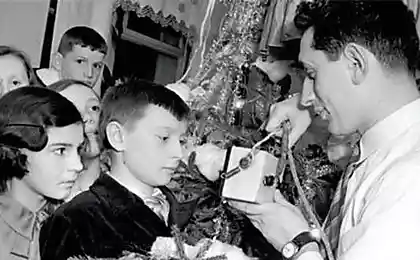516
16 things I realized after living a year in Japan
Eighty eight million eight hundred thirty eight thousand one hundred twenty one
Fifty two million one hundred thirty seven thousand eight
Journalist Amy Chavez now lives on the tiny Japanese island of Shiraishi Jima and lead editorials in several Western publications, which tells about the mysterious Japan. Us Site loved her insights about what Westerners can learn from the Japanese.
Man first appeared in Japan in the first place catches the eye of the public order and effective device all in all.
The streets are clean, trains come in second in the second, the people are calm and polite, but slightly eccentric, which gives them a charm (take at least widespread fascination with cosplay, ice cream with the taste of chicken noodles and a lottery where you can win a five-storey Burger).
But seriously, any trip to Japan, even the shortest, can greatly affect your life and Outlook. From Japan no one returns unchanged. In this post are my own conclusions and observations of the tourists I asked.
Ninety four million seven hundred fifty two thousand sixty seven
Japanese street fashionistas.
On the other hand, in this country do not have to provide equivalent value and return the favour. For example, if someone helped you to move the sofa when you move, enough to buy him a coke. And everyone will be happy.
Sixty seven million one hundred seventy six thousand five hundred seventy
Just geisha, just walking in Kyoto with a friend.
In a traditional Japanese house there are special places for guests opposite the niche tokonoma, where the most beautiful things — antique engravings, ceramics or elegant ikebana.
Seven million four hundred seventy four thousand six hundred sixty two
Twenty eight million eight hundred eighty four thousand four hundred forty
Tachinomi — popular Japanese bars, where one can only stand.
Thirty four million nine hundred thirty three thousand sixty five
Fun street food in Tokyo — the doughnut in the form of Hello kitty, ice cream-fish.
But if you invite guests, you can be sure that they will help to clear the table and even wash the dishes. The usual case, when the accountant pushing a broom in front of the office of the company, and the neighbors have shared Saturdays.
Sixty four million three hundred ten thousand seven hundred sixty eight
The temple Daigo-JI in Kyoto.
Photo preview of A Girl Eats World / Tumblr
Author Amy Chavez
According to the materials Rocketnews24
See also
15 things I learned after living two years in China
50 unexpected facts about Japan
via www.adme.ru/vdohnovenie/50-neozhidannyh-faktov-o-yaponii-630305/
Fifty two million one hundred thirty seven thousand eight
Journalist Amy Chavez now lives on the tiny Japanese island of Shiraishi Jima and lead editorials in several Western publications, which tells about the mysterious Japan. Us Site loved her insights about what Westerners can learn from the Japanese.
Man first appeared in Japan in the first place catches the eye of the public order and effective device all in all.
The streets are clean, trains come in second in the second, the people are calm and polite, but slightly eccentric, which gives them a charm (take at least widespread fascination with cosplay, ice cream with the taste of chicken noodles and a lottery where you can win a five-storey Burger).
But seriously, any trip to Japan, even the shortest, can greatly affect your life and Outlook. From Japan no one returns unchanged. In this post are my own conclusions and observations of the tourists I asked.
Ninety four million seven hundred fifty two thousand sixty seven
Japanese street fashionistas.
- To always return the favor
On the other hand, in this country do not have to provide equivalent value and return the favour. For example, if someone helped you to move the sofa when you move, enough to buy him a coke. And everyone will be happy.
- Thanks for the help at our next meeting
Sixty seven million one hundred seventy six thousand five hundred seventy
Just geisha, just walking in Kyoto with a friend.
- Politeness is more than just a "thank you" and "goodbye»
- To think about others more than himself
In a traditional Japanese house there are special places for guests opposite the niche tokonoma, where the most beautiful things — antique engravings, ceramics or elegant ikebana.
Seven million four hundred seventy four thousand six hundred sixty two
- All are part of the group and she never let anyone out
- They respect the property of others
- Here is completely safe to drink
Twenty eight million eight hundred eighty four thousand four hundred forty
Tachinomi — popular Japanese bars, where one can only stand.
- Sometimes the monopoly of the state — it is very good
- Arrogance is a Vice, and not "the second happiness»
- The Japanese are great listeners
- The Japanese are alien to nationalism
Thirty four million nine hundred thirty three thousand sixty five
Fun street food in Tokyo — the doughnut in the form of Hello kitty, ice cream-fish.
- Ganbaru (Ganbaru) — perseverance in achieving goals
- The promise must be fulfilled
- The Japanese are responsible citizens
But if you invite guests, you can be sure that they will help to clear the table and even wash the dishes. The usual case, when the accountant pushing a broom in front of the office of the company, and the neighbors have shared Saturdays.
Sixty four million three hundred ten thousand seven hundred sixty eight
The temple Daigo-JI in Kyoto.
- Refined behavior and elegance
- The Japanese are never late
Photo preview of A Girl Eats World / Tumblr
Author Amy Chavez
According to the materials Rocketnews24
See also
15 things I learned after living two years in China
50 unexpected facts about Japan
via www.adme.ru/vdohnovenie/50-neozhidannyh-faktov-o-yaponii-630305/






















